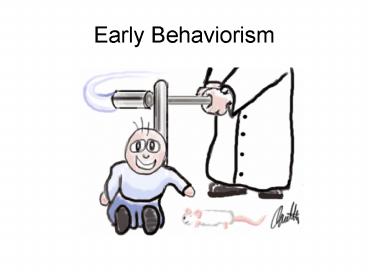Early Behaviorism - PowerPoint PPT Presentation
1 / 35
Title:
Early Behaviorism
Description:
A mechanistic, physiological theory saying that all behaviors are reflexes of the brain ... Experiment: Sound a tone - place food in a dog's mouth - dog salivates ... – PowerPoint PPT presentation
Number of Views:108
Avg rating:3.0/5.0
Title: Early Behaviorism
1
Early Behaviorism
2
The Influence of Darwin
- Says there are NO fundamental differences between
humans and animals
3
Reflexes
4
Ivan Sechenov (b. 1829)
- Studied with Muller, du Bois-Reymond, Bunsen,
Helmholtz - Research on inhibition of reflexes
5
1863 Reflexes of the Brain
- Brain was simply a center for organizing reflexes
- A mechanistic, physiological theory saying that
all behaviors are reflexes of the brain - Extension of physiology into psychology
6
Does the Name Pavlov Ring a Bell?
- Ivan Pavlov (b. 1849)
- Mugged in NYC
- Croaked from the flu
7
- Physiologist studied digestive reflexes
- Nobel prize for medicine 1904
- Digestive reflexes
- Physiological reflexes
- Psychic reflexes
- Saw conditioning as a way to understand brain
functioning - Conditional reflexes
8
Classical (Pavlovian) Conditioning
- He noticed that his dogs salivated at sight of
food from a cupboard - Neutral stimuli elicited salivation
9
- Experiment Sound a tone -gt place food in a
dog's mouth -gt dog salivates -gt after a period of
time the dog salivates at the sound of tone
10
(No Transcript)
11
Pavlovs Theory of Personality
- His dogs had 4 personalities
- Sanguine, melancholic, choleric, phlegmatic
- Based his assertions on balance between
excitatory and inhibitory processes
12
Charles Sherrington (b. 1857)
- Studied inhibition of reflexes in cat
- Concluded brain sends down inhibitory messages to
body - Synapses
- Multiple inputs, summation, inhibition,
integration - Behavior controlled by external and internal
stimuli
13
Transition from Reflexes to Behaviorism
14
Edward Thorndike
- 1898 dissertation cat in the box study
- Gradual and continuous improvement on performance
- Strengthening of association
- Direct, mechanical connection between stimulus
(puzzle box) and response (pulling string)
15
(No Transcript)
16
Thorndikes S-R Learning
- Throwback to the associationists (Hartley, Mill,
Bain) - The mind is ONLY S-R connections
- 1911 Animal Intelligence
17
The Law of Effect
- If effect of a response is positive, S-R
connection is strengthened - If the effect of a response is negative, S-R
connection gets weakened
18
Learning
- Learning always involves acquisition of new S-R
associations - Associations acquired by automatic, stamping-in
of the law of effect - Thoughts and intentions play NO role in learning
19
Watson's Behaviorism John Watson (b. 1878)
20
School at Furman U.
21
- Chicago with Dewey Angell
- Moved to neurology
- 1903 dissertation on rats development
- Marries a student!
- 1908 Johns Hopkins
22
1913 Psychology as the Behaviorist Views It
- Behavior is ALL there is
- No mind in psychology
- Against introspection structuralism
functionalism
23
1914 Behavior, An Introduction to Comparative
Psychology
- Animal Psychology methods
- Emphasis on S-R connections
- New theory of learning
- Contiguity of S and R important
24
Watson and Pavlov
- Translated Pavlov (from French) to English
- Reproduced Pavlov's experiments in his lab
25
Thinking
- We don't think, we only "think we think"
- Thinking is barely perceptible movements of mouth
and throat
26
Emotions
- Emotional responses in infants are really
behavioral responses - Emotions like fear, anger, joy seen as nothing
but responses made to certain stimuli
27
1920 Watson and Rayner "Little Albert"
experiment
- Conditioning of fear
28
Problems w/ Little Albert Study?
- Distortions in the story
- Ambiguity about his age
- Some are skeptical that conditioning occurred in
the way Watson described
29
Treatment of Mental Illness
- Symptoms were simply conditioned reflexes where
the conditioning was counterproductive - Psychologists should become social engineers
- De-conditioning precursor to systematic
desensitization
30
Motivation and Instincts
- Motivation was too mentalistic
- E.g., hunger stimulus, eating response
- No instincts complex chain of reflexes
31
Watson and Child Development
- Psychological Care of the Infant and Child 1928
- First son Billy Became a Freudian, later
suicide - Second son Jimmy severe psychological problems
- Daughter Polly Attempted suicide numerous times
32
How to Commit Career Suicide Big John and
Rosalie
- Watson 42-yr-old professor
- Rosalie Rayner 19-yr-old student
- Watson Rosalie dismissal from Hopkins
33
Watson and Advertising
- Tested smokers preferences blindfolded
- Piloted timed obsolescence
- Marketing research
- Conditioned fear advertising
34
Watsons Contributions
- Provided a scientific psychology
- Mind Behavior
- Everything in psychology could be explained in
terms of S-R connections - Advertising and Marketing pioneer
35
- Died in 1958 from cirrhosis of the liver































